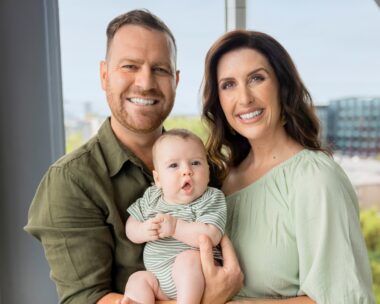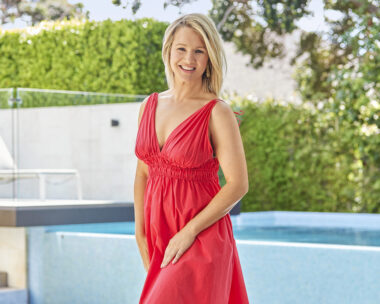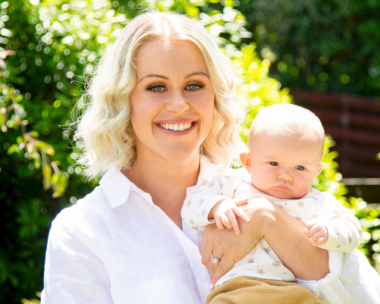At 5am on a Saturday morning in June last year, Seven Sharp reporter Te Rauhiringa Brown awoke, nine days overdue with her third son, knowing she would soon meet her baby, Taimaririkura i hikitia te ata o Toi Stokes.
Waking her partner, golf coach and actor Mauri Oho Stokes, Te Rauhiringa said the words they had both been patiently waiting for, “Kua tae te wā” – the time has arrived.
“My kuia [grandmother]had gone into hospital, so we had my 10-month-old niece Hawaiki sleeping over and we have this joke that she called our son into the world because he was jealous of her getting all the attention,” laughs Te Rauhiringa, 31.
From the moment the TV reporter – who also presents the weather for 1News – and her Ahikāroa actor beau found out they were expecting, they began to plan a pregnancy and birth deeply steeped in Māori tradition.
Both were raised attending kōhanga reo and kura kaupapa (Māori immersion education), and wanted their son to benefit from the same strong connection to his culture.
For them, this meant a home birth surrounded by their extended whānau, waiata (songs) Māori playing in the background and using the time-honoured practises of karakia (incantations), oriori (traditional chants) and reciting whakapapa (ancestry lineage) to support their baby’s entrance into the world.

They also moved in with Mauri’s parents, Kanewa and Peter, in Auckland suburb Devonport, to have inter-generational support for their new son, plus older boys Te Māpuna, 13, and Te Rangikohea, 10.
“We rented out our home in Hobsonville and we’re so lucky to have the privilege of being here with whānau,” says the mother-of-three. “With my other boys, I was at university grinding hard and before baby, we were both busy with all the amazing mahi [work] we love. But our baby has slowed us right down, which is a beautiful thing.”
Sharing her birth story with the Weekly, Te Rauhiringa says it exceeded all of her expectations and she felt completely supported by Mauri, who caught his son, and the 30 whānau members who came.
“What was most beautiful was the freedom and the tino rangatiratanga [sovereignty] in the birth space. I wanted my siblings and all their kids there, because my nieces and nephews are like my other children,” she smiles.
Meanwhile, her nan Irene Rama, who raised Te Rauhiringa and helped with her eldest sons, was watching via livestream from the hospital.
“I was in the pool, no one was talking and all the kids were quiet. We had this beautiful reo Māori playlist that encompassed what we wanted for our baby, and galaxy lights. I really tuned in and it felt like another dimension.”

After five hours in the birth pool, Te Rauhiringa instinctively knew her son was close.
“He’s the biggest baby ever born in our whānau. It wasn’t hard but towards the end, he just wouldn’t come around the corner. I said to his pāpā, who was in the pool with me, ‘Do your job.’
“As soon as Mauri started reciting his whakapapa [genealogy] and karakia, baby came right around. My mum did a karanga [ceremonial call], his dad did a karakia and low and behold, we had this big 55cm long, 9.4lb [4.2kg]baby, and our whare [home] was filled with tears and aroha [love].”
Mauri, 32, was the first to hold their son, catching him in the water and lifting him up to his beloved.
“We had been waiting for him so long – it was just unbelievable to see him in my darling’s arms,” recalls Mauri, explaining for years they struggled to conceive and were ready to see a fertility specialist. “Catching baby and bringing him into the world is a moment I’ll never forget, and I wish every father could experience it.”
In almost every way, it was their dream birth, but they laugh remembering not everything went to plan. There was a hole in the birth pool, so Mauri’s mum sat for hours pumping it back up. And with the base deflated, Mauri was extremely uncomfortable kneeling in the pool on the wooden floor.

“I was trying to work out how to tell her,” laughs Mauri, who didn’t dare mention it while Te Rauhiringa was mid-labour.
While it bucks convention to invite 30 people to watch you give birth, Te Rauhiringa explains that in her whānau, it’s the norm. She’s one of nine siblings and grew up accompanying her then-midwife mother Joanne Rama to births as a child. So when one of the whānau goes into labour, everyone knows their role and turns up to help.
For Mauri’s family, it was a first. His mum Kanewa works helping Māori into medical careers, his sister Atawhai is a doctor and his father Peter is ex-emergency services, and all are more used to birth in a hospital setting.
Says Te Rauhiringa, “It was really special to have everyone here, to expose Mauri’s whānau to the magic of homebirth and for them to see my wha¯nau in the epitome of manaakitanga [hospitality and generosity].
“By the time the birth had finished, Mauri’s whānau had prepared kai, we did a karakia and lifted the tapu [sacred state] of our whare, then we went into the garage together to have breakfast – and the eggs and mince were ready to go.”
Nestling together, Te Rauhiringa and Mauri are beaming as a serene and smiling Taimaririkura, now nine months old, bounces on her lap.

“We’re still in disbelief,” says Te Rauhiringa. “Every day, we wake up and marvel that we made a baby, and tell each other, ‘Look how beautiful he is.’ He’s so chill and loves kapa haka. It’s still surreal that we have number three.”
Seeing Te Rangikohea and Te Māpuna with their little brother has been another highlight for Te Rauhiringa. “Watching them hold him for the first time, I bawled. He’s going to grow up with these two massive humans and security guards for the rest of his life!”
There’s certainly no shortage of love for Taimaririkura, with his parents explaining how well supported they’ve been.
“The first few nights, Mauri’s mum stayed up every hour he was awake. One night, we all slept in the lounge on mattresses around him because everyone wanted to be with him. And still now if our baby cries in the morning or in the night, there’s a knock on the door to check he’s okay or an offer to make a bottle.”
Mauri adds, “I never had living grandfathers, so it’s really cool watching my dad with him.”

Te Rauhiringa shares it’s been completely different from the postpartum months she experienced with her older boys and an incredibly healing experience for her.
“Not everybody has the privilege of this,” she says. “With my other boys, I had my village but my whānau was going through their own things and we didn’t have the support of their dad. I fell into postnatal depression and anxiety, but I didn’t understand what it was back then.”
When she had her first son, Te Rauhiringa was 18 and a single mum hustling to study and provide.
“I grieve for the younger version of me, but I look at the way I get to experience this, and it’s another level of gratitude and appreciation. Now I don’t even have the chance to get tired because someone is always there to help.”
Te Rauhiringa has recently started back at work part-time, reporting for Seven Sharp and presenting the weather for 1News.
“I love what I do, getting to tell really beautiful stories and I know while I’m at mahi, baby is with his dad and koro [granddad]. I miss him, but I also don’t really get a chance to because they send me videos every 30 minutes.”

Walking to place Taimaririkura in his favourite Jolly Jumper, Mauri, who is due to start filming season six of Ahikāroa, playfully chats with his baby. “I love it when Te Rauhiringa’s not here because I get more attention, aye my son.”
Pausing to laugh, Te Rauhiringa continues more seriously, “Now, more than ever, hearing te reo on the weather and on [bi-lingual TV series] Ahikāroa is important for our babies. We look at him and we want to raise him to be unapologetically himself, knowing his reo and where he comes from.
“His name Taimaririkura i hikitia te ata o Toi was a very special gift from his aunty Ani-piki Tuari – she chose this name, ensuring that each part is a reminder of his many tribal connections and his whakapapa.”
With their precious boy in their arms, life has never been so good and they plan to make the most of every moment.
“Our baby will only be this little and need this much love for a short time, so we want to experience every little thing together with our whānau,” enthuses Te Rauhiringa. “We waited so long to have him, but it was so worth it.”
 Images: Robert Trathen
Images: Robert Trathen


